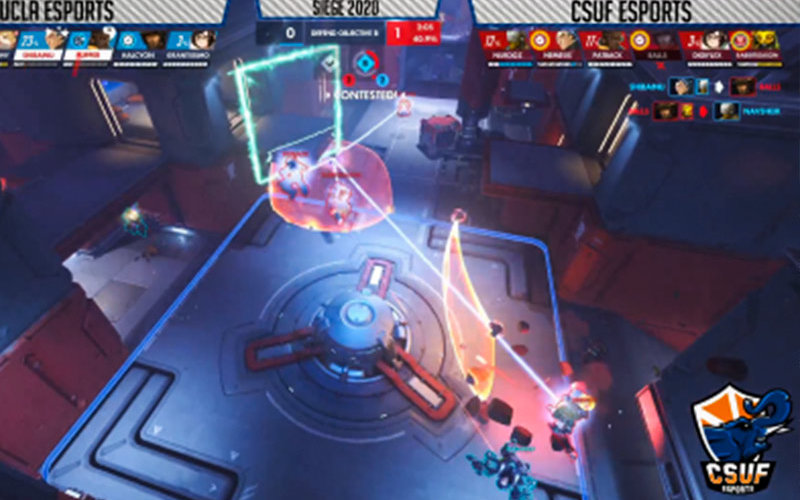
With more than 170 collegiate-based esports programs across the country, and the rise of Southern California as a hub for the esports industry, many Cal State Fullerton students are realizing the benefits of gaming beyond entertainment.
Many are interested in pursuing academic content, internship and career opportunities that allow them to combine their passions with a viable career path. Others join esports to meet and engage with like-minded peers on campus.
Additionally, organizations like the North American Scholastic Esports Federation have helped esports grow at the high school level in Orange County and as a result, young students are increasingly drawn to continue these activities into their college years.
Titans Host SIEGE Tournament
Recently, the varsity players of the Gaming and Esports of CSUF club sponsored their sixth annual SIEGE (Student Interactive Entertainment Gaming Expo) Varsity Showcase. The event, previously held on campus, was held virtually because of COVID-19.
This year, CSUF teams played against other colleges in three different games: Overwatch, League of Legends and Rocket League. (The team won the Overwatch game against UCLA, lost a close game in Rocket League to Long Beach, and lost to UC Santa Cruz in League of Legends.) All three games are published by Southern California-based gaming software companies Blizzard, Riot Games and Psyonix, respectively, and enjoy passive popularity worldwide. League of Legends alone has 40 major tournaments in 30 cities around the world, and is broadcast in 18 languages.
“The tournament was strictly for entertainment purposes,” said Steve Walk, associate vice president for South County Operations and Initiatives. “Many collegiate esports groups in California are already connected online so matches were scheduled between these teams.”
CSUF esports varsity players must complete a session of tryouts that are observed and managed by higher-tier players. Each game has its own player rating system, and each team represents the top CSUF players who not only are skilled at their respective games but are able to devote time and effort to help the teams win and the club to prosper.
Adam Nelson, president of the club and a senior majoring in communications, has been working in the esports industry for almost eight years.
“Being a part of this club has truly been a life-changing experience,” he said. “I cannot stress enough how important it is to join a campus club or maintain relationships outside of campus life.”
So how did this group come to be? Like with most student clubs, a group of students came together around a common interest, elected leadership and organize membership activities each year.
“When students come to campus for the first time, they often seek connections with students who have common interests,” Walk explained. “CSUF esports has provided students with opportunities to share gaming space and a welcoming social environment whether in person or online.”
Each semester brings about 100 new students to the group, ranging from competitive players to those who play more casually. Following the club’s social media is generally the easiest way for students to learn more (Twitter: @csufgaming, Instagram: @csufgaming).
The Growth of Gaming
Initially, many traditional sports were among the original electronic games alongside those reflecting fantasy storylines.
“A few major turning points radically changed the scale and popularity of these activities,” said Walk, who holds a dual major doctoral degree in kinesiology and sociology from Michigan State University. “The first stemmed from major advances in technology that made games increasingly realistic, multilayered and complex, with advancement in the games requiring the overcoming of increasingly difficult challenges to players.
“Second was the fact that game content could increasingly reflect both actual human beings in very realistic environments often seen in sports-themed video games, like the Madden NFL series, as well as the most fantastical fictional stories and worlds one could imagine such as World of Warcraft, and all things in between.”
Finally, Walk believes the key turning point for esports was the advent of the web and the possibility of playing with and against anyone around the world with an internet connection, making live competition on a worldwide scale possible, and truly globalizing the phenomenon.
“Esports have, in many ways, followed the pattern of other sports in their development,” said Walk. “The games are widely accessible to people who have played the games themselves, and from this perspective they enjoy watching those who play at high levels. Gamers attach important symbolic significance to competitive outcomes representing institutions they care about such as club teams, schools and even nations.
“As the cultural anthropologist Clifford Geertz said, ‘Games are stories people tell themselves about themselves.'”
Contact: Valerie Orleans, vorleans@fullerton.edu